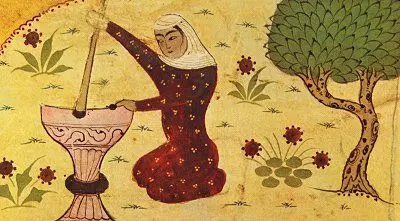 Hazrat Rabia Basri was the one who first set forth the doctrine of Divine Love known as Ishq-e-Haqeeqi (Divine Love) and is widely considered being the most important of the early renunciants, one mode of piety that would eventually become labeled as Sufism.
Hazrat Rabia Basri was the one who first set forth the doctrine of Divine Love known as Ishq-e-Haqeeqi (Divine Love) and is widely considered being the most important of the early renunciants, one mode of piety that would eventually become labeled as Sufism.
Rabia Basri lived in the 8th Century in what is now lraq. She left no writings behind, but much of her life was documented by the poet Attar of Nishapur in the 12th Century. It’s said that Rabia’s family were slaughtered and she was captured and put into indentured service. One day, the captor saw her praying and was so overwhelmed by the singularity of her focus and the poetry that came from her that he became her follower.
Rabia embraced the reality of Love as the way to approach God. She uses the word ishq to speak of this Love – a word filled with devotion, togetherness and sensuality. The 8th Century in which Rabia lived is known as the Islamic Golden Age, when the great city of Baghdad was founded, and prosperity, learning and reward were plenty and accessible. While she did not condemn these realities, she pointed to a deeper one. She felt you should not do good because of rewards, but simply because it is good. Rabia was sought out by both women and men for her wisdom, breaking the ideas that only women should seek insight from a woman religious.
In this way she is a classic Sufi, for within that tradition all barriers and false delineations should be transcended. For Rabia, everything – reward, gender, power – fell short of the great goodness of being single-minded in pursuit of Love.
If I worship You because of Fear of Hell
then burn me in Hell;
lfl worship You because I desire Paradise,
then keep me from Paradise;
If I worship You for Yourself alone,
then do not exclude me from Your Beauty.
-Rabia Basri
It has been asked why Rabia Basri has not been canonized as much as Rumi. Is it because of the fact that Rumi reigned from an affluent background and had scribes writing down each of his words? Could also be because of her gender? Perhaps that is why few white men have picked up her existing poetry and life and have decided to write about her, or even tried to excavate the truth about her. Perhaps there is some level of internalized misogyny that prevents writers from incorporating her in mainstream culture, the age-old question: how can a woman transcend the bodily and the worldly, to become nothing but a soul? After all, in all other traditions and religions most saints have been men.
Rabia Basri was the mother of Sufism who taught future mystics, the doctrine of Ishq-e-Haqeeqi (true/Divine love). In the words of Farid Al-Din Attar, praising Rabia Basri’s unparalleled status as a female Sufi saint in the Conference of the Birds:
No, she wasn’t a single woman,
But a hundred men over:
Robed in the quintessence of pain
From foot to face, immersed in the Truth,
Effaced in the radiance of God,
And liberated from all superfluous excess.

![]()

